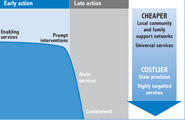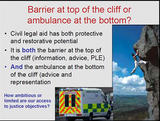The Triple Dividend: Thriving lives. Costing less. Contributing more. Introducing the 'ready for everything' agenda
‘How do we build a society that prevents problems from occurring rather than one that, as now, copes with the consequences?’
This difficult challenge was considered by the Early Action Task Force, a panel of experts set up by Community Links. The Task Force’s ideas about how to develop a community ‘ready for everything’ are set out in this influential report. Their arguments in favour of early intervention and enabling services chime with public legal education which aims to create communities that are legally capable and indeed 'ready for everything'. Read: The Triple Dividend: Thriving lives. Costing less. Contributing more. The Task Force propose that early action should be a fundamental principle shaping the way in which both government and civil society spend their resources and judge their success. ‘Early action’ is used to cover all forms of early intervention - not just the earliest stages of social and personal development, but earlier action at all critical life stages. They picture a society where everyone is ready and able to benefit from opportunities and manage problems:
‘Because we all experience difficulties at some point in our lives, they are ready and able also to manage adversity – to cope with losing a job or a relationship, to rebuild after illness or bereavement, to adapt to change.’
A gradual and sustained transition towards a society that is 'ready for everything' needs new attitudes and new behaviours. The paper advocates using a new language, saying that the language of prevention should be replaced by the language of ‘readiness’ which is much more ‘optimistic, aspirational and motivating’
'We envisage a society that is ready for everything characterised by ‘enabling services’ that equip us to flourish and by ‘prompt interventions’ that pick up and respond to the first signs of difficulty.'
 'Early action – building a fence at the top of the cliff rather than running an ambulance at the bottom'.
'Early action – building a fence at the top of the cliff rather than running an ambulance at the bottom'.The Triple Dividend
Early Action Task Force 2011
The report has an excellent diagram to illustrate their theory. The ‘ready for everything’ community is at the top of a cliff, where universal ‘enabling services’ and clear rules equip us to flourish, protect us from harm and prepare us for change.
'Prompt interventions' at the cliff edge pick up the first signs of difficulty and respond to them, targeting services at individuals, families and communities with identified problems which, if not forestalled, could, in many cases, lead to more serious difficulties. Further down the cliff face the service becomes more targeted at those with more developed problems and 'prompt intervention' gets closer to an ‘acute service’. Eventually it is primarily focused on ‘containing a problem’ at the bottom of the cliff rather than on forestalling it. Late action kicks in once the problem has tipped over, essential but, in every sense, a last resort.
Re-imaging the prevention agenda
Re-imaging the prevention agenda with a different vocabulary shifts thinking away from attacking negatives and on to developing the positives. The Task Force believe that it is from this alternative perspective that we can envisage, and build, the society we seek. In their vision of this society, we would:
- Excavate and uproot the causes of problems;
- Invest in our quality of life now and in our children’s futures, rather than store up ever greater social, health and environmental problems which our children will have to pay for;
- Build readiness. Invest in people’s capabilities before they need welfare, rather than stepping in when people are not able to provide for themselves. It is an ‘enabling state’ – the antithesis of the ‘nanny state’ and the next evolutionary step beyond the ‘welfare state.’
The Triple Dividend
The Task Force proposes that early action should be a fundamental principle shaping the way in which both government and civil society spend their resources and judge their success. Investing wisely and early in social wellbeing yields a triple dividend – thriving lives, costing less, contributing more.
'Politicians have been talking for years about the economic as well as the social case for earlier action but it is invariably understated. Early action isn't only cheaper than later action and important for social wellbeing; it helps to reduce the deficit and to increase growth. A population that is ‘ready for everything’ contributes more, public spending goes down and growth goes up: thriving lives, costing less, contributing more.'
Read: The Triple Dividend: Thriving lives. Costing less. Contributing more. The Early Action Task Force is an advisory group. This is their first report and was launched in the House of Lords in November 2011. It is open for discussion, and comments should be directed to David Robinson OBE, the co-founder of Community Links. David can be contacted by email here. You can also sign up for news from Community Links on early action. The Task Force is consulting on some ideas around an Early Action Alliance to help further the 'ready for everything' agenda. The Task Force is funded by The Big Lottery Fund and the Barrow Cadbury Trust.
Note: 'Legal aid and access to justice: Back to basics'
In October 2009, Professor Dame Hazel Genn, a leading authority of civil justice gave a presentation, 'Legal aid and access to justice: Back to basics' as part of the Law Society's Access to Justice Project. Professor Genn looked at the fundamentals of access of justice and asked whether a smarter approach to legal services is needed.  Using a similar analogy, Professor Genn said:
Using a similar analogy, Professor Genn said:
'Civil legal aid is protective and restorative. It is both the barrier at the top of the cliff (information, advice and public legal education) and the ambulance at the bottom of the cliff (advice and representation).
Read our write up on the presentation. The Institute for Sustainable Futures based at the University of Technology in Sydney, Australia also used this analogy back in 2006 in The Economic Value of Community Legal Centres. They concluded:
‘It is important to emphasise that the value of this preventative work is far greater than the reactive costs that would be incurred in the absence of such services. It is indeed a truism that the fence at the top of the cliff not only saves lives, but it is also much cheaper than the ambulance at the bottom.’
Read more about legal services in Australia.
Last edited March 7, 2023